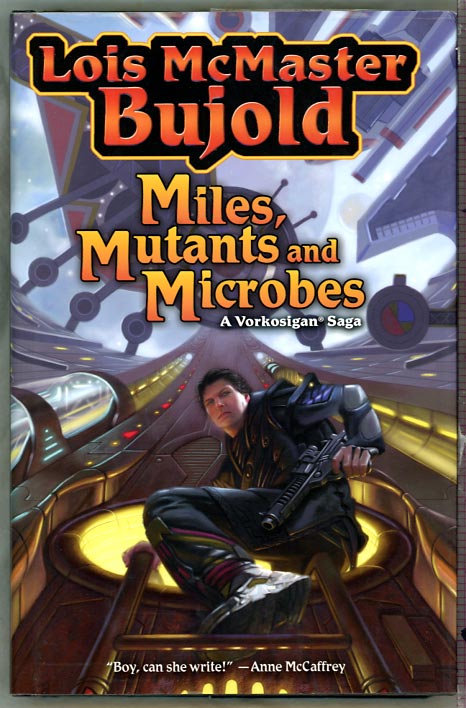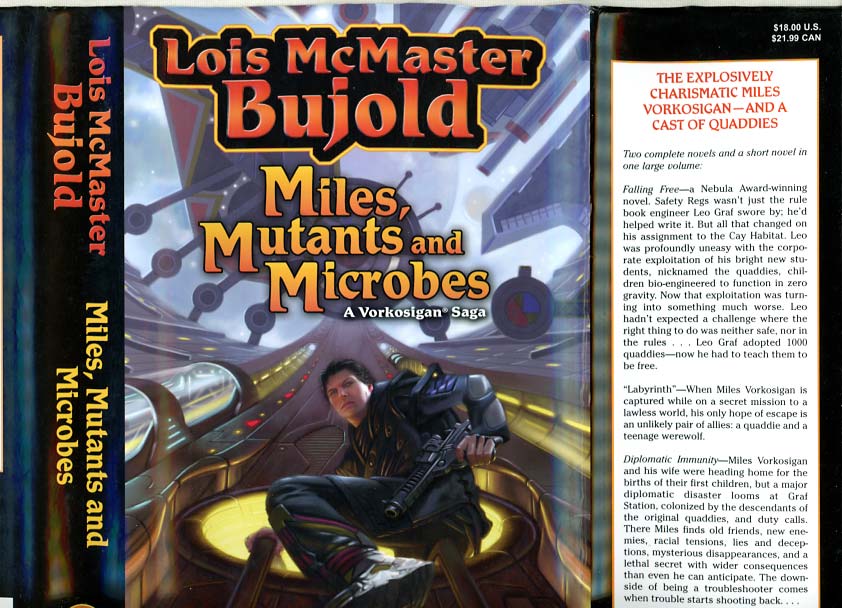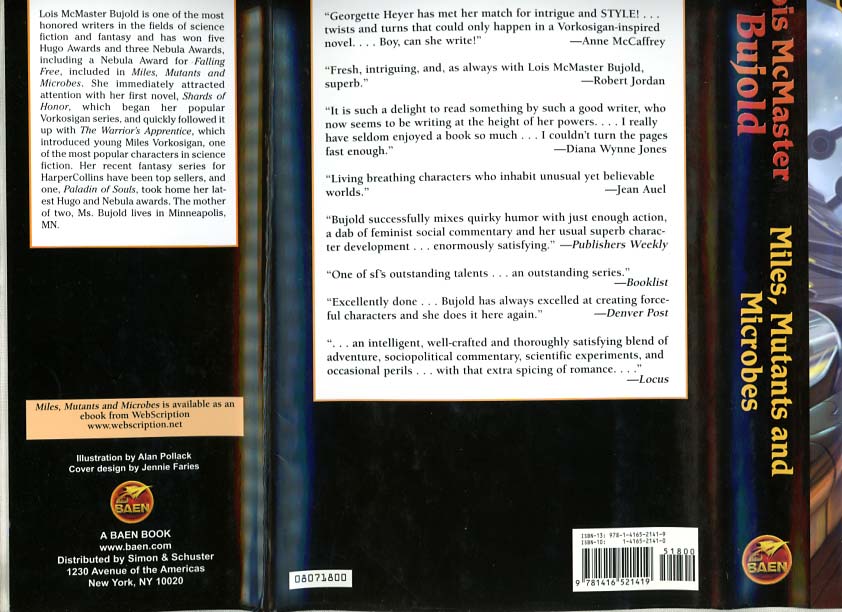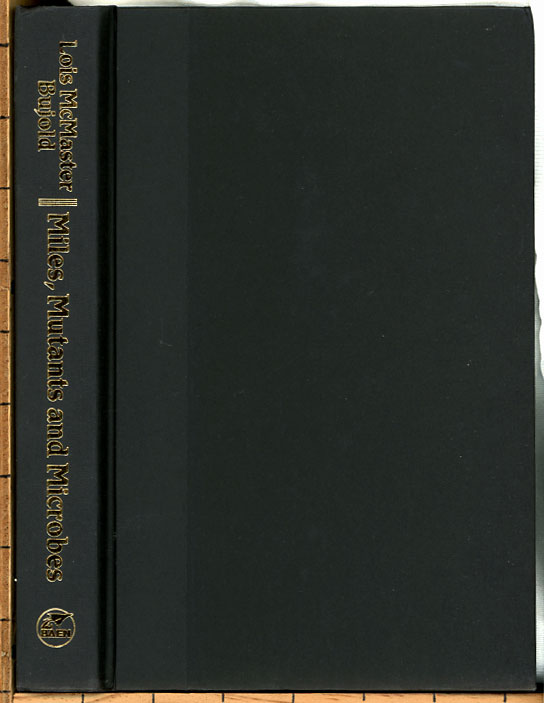
author:
title:
Bujold, Lois M.
MILES, MUTANTS and MICROBES [mv]
(reprint) omni, plus stories: 2007
edn-date:
printing:
format:
cvr art:
cvr price:
GRADING:
2007
1st
(Tall) Hardcover
Alan Pollack
$18.00
Book= VG to VG+
Dustjacket= VG+ or better
Omnibus of: FALLING FREE (1988) + "Labyrinth" + DIPLOMATIC IMMUNITY (2002), with a Preface by Bujold, and a timeline at the end. These are the tales that feature the genetically engineered "quaddies" - the first takes place 200 years before the two starring Miles Vorkosigan.
Falling Free - the fourth novel by Lois McMaster Bujold. Serialized in Analog in 4 parts, from December & Mid-December of 1987 to February 1988. This won the Nebula award for Best Novel. Set in the same "universe" or future-history as her Vokosigan books, this takes place about 200 years before most of them. Here's the flap-copy from the first hardcover, followed by some comments by me:
Leo Graf was not your typical ambitious company man; he was a brilliant engineer whose vocation had always meant more to him than climbing any corporate ladder. So when he was sent by GalacTech to join the Cay Project—specifically, to teach quality-control procedures in free-fall welding and construction—he figured it was just another routine assignment...nothing new or different that was going to make or break his reputation.
That is, until he found out that his classroom was an orbital habitat and his students were quaddies— youngsters, the oldest of them just in their twenties, who had been bioengineered for life and work in free fall. People whose most obvious adaptation, an extra set of lower arms and hands instead of legs and feet, made them far superior to other humans in null-G.
The man currently in charge of the Project, Bruce Van Atta, one of the company's typical rising young executives, made it clear that he considered the quaddies nothing more than intelligent property—useful freaks. But Leo couldn't help seeing them as human beings. And as he got to know them as individuals, he realized how dangerously naive they really were...how their sheltered lives and inexperience with the mainstream of human society made them completely vulnerable to exploitation.
Then word of a newly developed artificial gravity device reached the Habitat, rendering the quaddies and the entire Cay Project obsolete—and thereby disrupting Van Atta's dreams of corporate glory.
Hoping to salvage his career by demonstrating his acumen and resourcefulness in the face of such economic calamity, Van Atta made plans to dispose of the now useless human property as cheaply as possible.
It never occurred to him that Leo Graf or the quaddies themselves would dare to get in the way.
[My comments]: There are some pieces of future technology that Bujold has gotten a lot of milage out of - she has run amazing permutations on her truth drug ("fast-penta"), and the quaddies in this novel were made possible by the uterine replicators which appear in many of her books. The dedication of the book is to "Dad" - her father was a professor in welding engineering. Analog was a favorite of her dad, and Lois read it as a teen when discovering SF. To me, this is in many ways the perfect Analog serial: the hero is an engineer who becomes caught up in a revolution, wanting to apply engineering skills and flow-charts to the problems involved. Bujold did her research and it shows - the engineering details/problems sound right and are consistent.
One reason Bujold is my favorite writer is that she is a combination of cynic and romantic. In the first chapter, Leo is introduced to the quaddies, and quickly realizes how vulnerable they are to exploitation. Knowledge of the "Peter Principle" is shown when his current boss (Van Atta) turns out to be someone Leo had "kicked upstairs" to get him out from underfoot. Bujold knows (and shows) how good intentions can lead to the most appalling results - as when a pair of quaddies (with child in tow) attempt to escape but have no idea how the "real world" works. As a romantic, she makes the quaddies characters who have our sympathy - with unrealistic and romantic ideas about downsider life (what do you expect when those ideas are based on smuggled adventure videos or The Prisoner of Zenda?) Bujold is showing increased confidence/mastery as writer: every scene and detail supports and builds her tale. When Leo Graf has his moment of inspiration and conceives his plan for revolution and escape - it seems inevitable and logical. This one has you cheering for the good guys.
Diplomatic Immunity, by my favorite SF writer - Lois McMaster Bujold. I find her books compulsively readable, and well worth re-reading. (The fact that she's won 5 Hugo awards and a Nebula award - for novels - doesn't hurt, either.) She has a writing style that asks "what's the worst thing that can happen to this character?" and then shows us how her character deals with or solves the situation - often growing or learning in the process. She doesn't skip the hard parts but writes through them, showing the details. Another aspect that I particularly like is the way her characters have an immediate response or reaction that they think but don't voice - often uncomplimentary (something we can recognize in ourselves.) As a Bujold fan I'll be happy to sell as many nice copies of her books as I can find.
[I'll start with the flap-copy from a hardcover, and expand on that for a plot summary/teaser...]
"A rich Komarran merchant fleet has been impounded at Graf Station, in distant Quaddiespace, after a bloody incident on the station docks involving a security officer from the convoy's Barrayaran military escort. Lord Miles Vorkosigan of Barrayar and his wife, Lady Ekaterin, have better things on their minds, such as getting home in time to attend the long-awaited birth of their first children. But when duty calls in the voice of Emperor Gregor, Miles, Gregor's youngest Imperial Auditor (a special high-level troubleshooter) has no choice but to answer. Waiting on Graf Station are diplomatic snarls, tangled loyalties, old friends, new enemies, racial tensions, mysterious disappearances, and a lethal secret with wider consequences than even Miles anticipates: a race with time for life against death in horrifying new forms. The downside of being a troubleshooter comes when trouble starts shooting back... "
[My comments]: The latest by internal chronology (as of 2002) of the books which feature Miles Vorkosigan, and Bujold expertly combines threads from earlier books or stories to bring results at this particular place and time. (If you think back to when he last encountered Quaddies, you'll have a good idea of who from his past will be here.) Miles continues to grow into his new role of Imperial Auditor, having to play the familiar role of detective to find out what actually happened (and why.) Miles is supposed to be past his action/adrenaline days, but somehow he ends up in situations where his old habits are needed - and continues to be adept at exploiting whatever clues or opportunities are presented. This one tends more toward the light/manic side of Bujold, but like any of her books, delivers satisfying moments and surprises.



